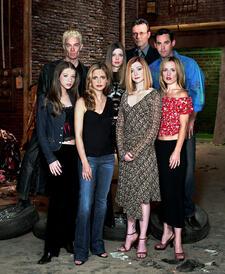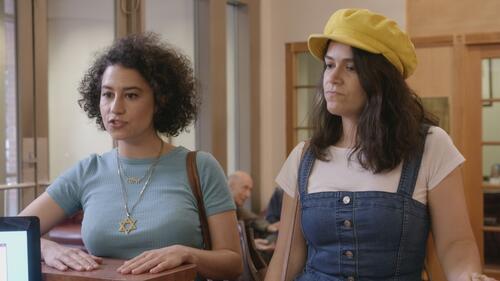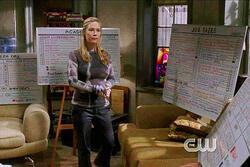Authenticity, Please: TV’s Jewish Ladies
If you haven’t read my work before, you may not know that I’m a huge fan of 90s and early-2000s TV shows. Like, watched-every-single-morning-with-my-mom-before-school, huge fan. I was always enamored by the female characters in these series: Willow Rosenberg on Buffy the Vampire Slayer, Paris Geller on Gilmore Girls, and Fran Fine on The Nanny, to name a few.
It wasn’t until years later that I realized these characters I grew up watching, adoring, and imitating all had one thing in common: They were Jewish.
Today, Buffy and Gilmore Girls have permanent homes in my “Continue Watching For Rena” list on Hulu and Netflix, but I’ve also made room in my watch lists—and in my heart—for newer shows and their Jewish heroines, such as Beverly Goldberg on The Goldbergs, Mona-Lisa Saperstein on Parks and Recreation, Abbi Abrams and Ilana Wexler on Broad City, and Rebecca and Naomi Bunch on Crazy Ex-Girlfriend.
As a woman who has come to understand my own Jewish identity—and all the implications, assumptions, and stereotypes that come with it—I now view all of these shows with new eyes. Where once, I saw a quirky Jewish girl on TV, now I see a one-dimensional character stifled by a stereotype. Because of my heightened feminist consciousness, I understand how some of the characters I used to idolize (and still do in some cases) are problematic, stereotypical representations of Jewish women. These characters are socially awkward, or obsessive, or spoiled... but could they be much more than that? Let’s review!
“The Brainy Jewish Adolescent”
When I was first introduced to Willow Rosenberg in season 1 of Buffy, I saw myself. She’s the studious, awkward teacher’s pet. She wears plaid jumpers and trips over her own feet. Willow describes herself as a “doormat person,” a “homework gal.”
Although her Judaism is referenced minimally throughout the show, it’s there. In the second season, for instance, Willow must adorn her room with Christian symbols to protect herself from a vampire, and says to Buffy, “I’m gonna have a hard time explaining this to my dad… Ira Rosenberg’s only daughter nailing crucifixes to her bedroom wall?”
Willow does transform over the course of Buffy and steps outside of this “Brainy Jewish Adolescent” mold, but the series thoroughly punishes her character for such behavior. Believe me, I have a lot to say about this one.
As my years of watching early-2000s shows continued, I met the quick-talking, coffee-drinking, mother-daughter duo of Lorelai and Rory in Gilmore Girls (who, to this day, remind me ever so fondly of me and my mother). Again I found the stereotypical “Brainy Jewish Adolescent,” this time in Paris Geller. Like Willow, she’s a top-of-the-class student and a know-it-all…but that’s where the similarities end. Paris is conceited, bossy, snobby, and manipulative. She’s the girl with no experience outside of the classroom, who spends all of her time trying to achieve academic success.
Again, Paris’s Judaism is only briefly mentioned when others, or the situation at hand, make the space for it. When Paris gets asked out on a date, for example, she brings her entire closet to Rory, everything except “[her] Chilton uniform and [her] bat mitzvah dress, which has menorahs on the collar.”
While I did see myself in both Willow and Paris, they are on the whole rather one-dimensional. We identify them as nerdy, sheltered Jewish Adolescents due to their names and stereotypical nature, for their respective series don’t make much space for their Judaism to exist elsewhere.
“The Jewish Mother”
I’ve found that the Jewish Mother on TV comes in two brands: Vocally Overwhelming, and Physically Overbearing.
When we first meet Naomi Bunch on Crazy Ex-Girlfriend, we only hear her—we don’t see her. We hear her questioning her daughter about the hickey on her neck, making very clear she will let nothing happen to her daughter’s career and future; they will “go right to the abortionist.” Flash-forward and we hear Naomi’s voice still droning over Rebecca Bunch’s phone ten years later, still nagging her daughter about her future and her career.
Similarly, Mrs. Wolowitz, Howard’s mother on The Big Bang Theory, is never seen. She’s only heard, recognizable by her stereotypically Jewish voice. She yells from off-screen, makes babying comments directed toward her grown son, voices her unwanted opinions and complaints.
On the other hand, Beverly Goldberg from The Goldbergs is introduced to the audience as the “overbearing smother,” as the woman who begins “the day by dressing [her three children], feeding [them], and ignoring any sense of human boundaries.” She constantly confuses protecting her children with smothering them, and manipulates those around her to “save” her “perfect family.” We almost see too much of her.
These examples are representative of the depictions of Jewish Mothers that we see in most American pop culture: The Jewish Mother that nags, smothers, and self-imposes—and manages to do so whether she’s on-screen or not.
“The Jewish American Princess”
“Money, pleaaaseee,” we hear as the Jewish American Princess steps on-screen. Mona-Lisa Saperstein from Parks and Recreation epitomizes the JAP: She’s obsessed with her appearance and status; she’s spoiled and narcissistic; she’s introduced by her own brother as “the worst person in the whole world. Huge skank.” Mona-Lisa is daddy’s little girl, wanting of everything, but unwilling to work for anything. She neither grows nor changes throughout the series; she serves the drama, whines while on-screen, and reappears every once in a while only to do the same.
Now I stand at a crossroads when it comes to these Jewish women characters. Do they make me laugh? Absolutely. Do I feel for them? Yes. Do their characters move the plot forward? Sure! But my problem lies with the fact that these Jewish women characters are barely more than caricatures who serve only to make the audience laugh or cringe. Television shows often reduce Jewish women to a few tired tropes, ones that are largely negative, or stereotypical.
I’ve come to learn that the high visibility of Jewish women on TV doesn’t equate to authenticity. The stereotypical characters we see often diminish Jewish women to “The Brainy Jewish Adolescent,” or “The Jewish Mother,” or “The Jewish American Princess.” It’s about time we trade in these stereotypes for more authentic, three-dimensional portrayals.
Let’s look to characters like Abbi and Ilana of Broad City, like Rebecca Bunch of Crazy Ex-Girlfriend, for inspiration. These are Jewish women created by Jewish women who laugh at themselves, write their own stories, and poke holes in these stereotypes by showing us just how messy and complicated (but funny!) life—and real Jewish women—can be.










Being a rather old Jewish male I can only peripherally comment. I saw almost all these characters start off as stereotypes and grow during the tenure if the various shows.
This is what is called a character arc. It would be sad if a character, any character, would stay the same. On the other hand I go tired of Crazy Ex-Girlfriend precisely because she stayed mostly the same, with the same reaction to events throughout.
Excellent writing and so true. Good job.